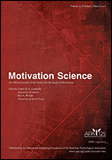
Motivation Science
Scope & Guideline
Innovating Research to Transform Motivational Understanding
Introduction
Aims and Scopes
- Understanding Motivational Constructs:
The journal focuses on various motivational theories, including Self-Determination Theory, Expectancy-Value Theory, and others, examining how these frameworks can explain human behavior and goal-directed actions. - Empirical Research on Motivation:
Motivation Science publishes empirical studies that investigate the antecedents, processes, and consequences of motivation in different domains, such as education, health, and social behavior. - Interdisciplinary Approaches:
The journal encourages interdisciplinary research that integrates perspectives from psychology, neuroscience, education, and behavioral economics to provide a comprehensive understanding of motivation. - Applications of Motivation Science:
Research published in the journal often explores practical applications of motivational theories in real-world settings, such as educational interventions, workplace motivation, and health behavior change. - Cultural and Contextual Factors:
The journal examines how cultural and contextual factors influence motivation, recognizing that motivation is not a one-size-fits-all construct but varies across different populations and settings.
Trending and Emerging
- Psychological Reactance:
Recent publications emphasize the concept of psychological reactance, exploring how individuals respond to perceived threats to their freedom and autonomy, which has implications for understanding motivation in compliance and behavior change. - Self-Regulation and Goal Pursuit:
There is an increasing trend in research investigating self-regulation processes and their impact on goal pursuit, highlighting the significance of self-control and metacognition in achieving personal objectives. - Contextual Influences on Motivation:
Emerging studies are focusing on how situational and cultural contexts shape motivational dynamics, indicating a growing recognition of the importance of contextual factors in understanding motivation. - Sustainable and Prosocial Motivation:
Research linking motivation to sustainable behaviors and prosocial actions is on the rise, reflecting a growing interest in how motivational factors can drive positive societal change amid global challenges like climate change. - Technology and Motivation:
The intersection of technology and motivation is increasingly being explored, particularly in relation to how digital environments and tools can enhance or inhibit motivational processes in various settings.
Declining or Waning
- Aggression and Motivation:
Research focusing on the intersection of aggression and motivation has been less prominent in recent publications, suggesting a potential shift away from exploring aggressive motivations towards more constructive and prosocial motivational themes. - Neurobiological Underpinnings of Motivation:
Although the neurobiological aspects of motivation were once a significant focus, the recent trend shows a decrease in studies explicitly linking neuroscience with motivational theories, indicating a possible waning interest in this area. - Habitual Behavior and Motivation:
The exploration of habitual behavior in relation to motivation appears to be declining, as fewer studies are published that address how habits influence motivational states or goal pursuit. - Environmental Motivational Factors:
While environmental influences on motivation have been discussed, there has been a noticeable reduction in studies specifically examining environmental factors, potentially due to a shift towards more individual-focused motivational research.
Similar Journals

EUROPEAN JOURNAL OF PSYCHOLOGY OF EDUCATION
Connecting theory and practice in the realm of education.Welcome to the European Journal of Psychology of Education, a leading scholarly publication dedicated to advancing the fields of developmental and educational psychology. Published by Springer, this esteemed journal boasts an impressive impact factor, firmly placing it in the Q1 quartile for both Developmental and Educational Psychology as well as Education as of 2023. With a Scopus rank of #171 out of 1543 in Social Sciences Education and a #63 ranking out of 360 in Psychology, it represents a vital resource for researchers, professionals, and students seeking to explore innovative educational practices and psychological theories from a European perspective. Founded in 1986, the journal has established itself as a cornerstone of contemporary research over the years and continues to publish high-quality articles that contribute significantly to the understanding of psychological principles in educational contexts. Although it does not currently operate under an open access model, its rigorous peer-review process ensures that only the most impactful studies are included, making it essential reading for those committed to advancing educational psychology.
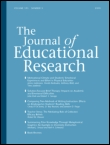
JOURNAL OF EDUCATIONAL RESEARCH
Exploring the frontiers of educational innovation.JOURNAL OF EDUCATIONAL RESEARCH is a premier publication in the field of education, disseminating high-quality research findings that inform practices, policies, and developments in educational settings. Published by Routledge Journals, Taylor & Francis Ltd, this journal carries a strong reputation with an impact factor that reflects its influence in the academic community. With a history that spans over a century, from 1920 to 2024, the journal has established itself as a key resource, achieving a noteworthy Q2 ranking in the education category and residing within the top 70th percentile according to Scopus rankings. It primarily focuses on empirical studies, reviews, and theoretical discussions that contribute to the understanding of educational phenomena. The journal does not currently offer open access options but remains highly regarded within the scholarly community as a vital source for researchers, practitioners, and students interested in advancing educational practices and policies.
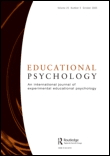
Educational Psychology
Empowering educators with evidence-based psychological strategies.Educational Psychology is a leading peer-reviewed journal published by Routledge Journals, Taylor & Francis Ltd, dedicated to advancing the field of educational and developmental psychology. With its ISSN 0144-3410 and E-ISSN 1469-5820, this esteemed journal provides a platform for innovative research and critical discussions that explore the psychological aspects of learning processes, educational interventions, and cognitive development. Recognized for its quality, it holds an impressive Q1 category ranking in various fields, including Developmental and Educational Psychology, and is ranked in the top 10% of its category in Social Sciences Education and Experimental Psychology according to Scopus Metrics. Spanning from 1981 to 2024, the journal not only publishes rigorous empirical studies but also theoretical articles that contribute significantly to the understanding of educational practices globally. Researchers, educators, and students alike will find this journal an invaluable resource for cutting-edge developments in the intersection of psychology and education, enhancing their academic pursuits and professional growth.

Social Psychology of Education
Fostering understanding of educational environments through social psychology.Social Psychology of Education is a prestigious academic journal published by Springer, dedicated to advancing the understanding of social psychological processes within educational contexts. With an ISSN of 1381-2890 and an E-ISSN of 1573-1928, this journal has established its prominence in the field, evidenced by its Q1 rankings in multiple categories, including Developmental and Educational Psychology, Education, Social Psychology, and Sociology and Political Science for 2023. It ranks within the top percentiles of Scopus listings, reflecting its influential impact on the research community. Spanning from its inception in 1996 to the present, this journal aims to publish high-quality, empirical, and theoretical studies that explore the intersection of social psychology and education, fostering a deeper understanding of how social factors affect learning environments and educational outcomes. Although it does not currently offer open access, researchers, professionals, and students leverage its findings to inform practice and policy-making in educational settings. Located in Dordrecht, Netherlands, the journal continues to be a vital resource for those interested in educational psychology and sociological perspectives on learning.

Psychology Society & Education
Advancing Insights at the Intersection of Psychology and EducationPsychology Society & Education is a distinguished journal published by EDITORIAL UNIV CORDOBA-UCOPRESS, dedicated to exploring the intersections of psychology, education, and society. With an ISSN of 2171-2085 and an E-ISSN of 1989-709X, this Open Access journal has been providing freely accessible scholarly articles since 2009, ensuring a wide dissemination of knowledge within the academic community. Based in Spain, the journal ranks favorably in its categories, including Q3 in Clinical Psychology and Q3 in Education, illustrating its growing impact in these fields. Offering a platform for rigorous research, reviews, and discussions, Psychology Society & Education invites contributions that advance understanding of psychological principles applied within educational contexts and societal dynamics. Its role in bridging research with practical applications makes it an essential resource for researchers, professionals, and students aiming to contribute to the evolving discourse surrounding psychology and education.

Perspectives on Behavior Science
Exploring the Nuances of Psychological ResearchPerspectives on Behavior Science, published by SPRINGER INT PUBL AG, serves as a pivotal platform in the field of psychology, encompassing comprehensive research and insights in Clinical Psychology, Social Psychology, and Experimental and Cognitive Psychology. Established in 2018, the journal is recognized for its rigorous peer-reviewed articles that contribute significantly to scholarly discourse, evidenced by its Q2 ranking in high-impact categories in 2023. With an ISSN of 2520-8969 and an E-ISSN of 2520-8977, it actively engages a global audience of researchers and practitioners keen on behavioral science advancements. The journal's commitment to open access ensures wide accessibility, enhancing the dissemination of knowledge. Each volume continues to illuminate the intersection of theory and practice, making it an essential resource for academic professionals and students pursuing profound understanding in the complexities of human behavior.
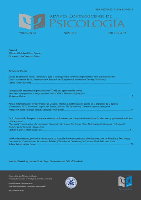
Revista Costarricense de Psicologia
Advancing psychological knowledge for all.Revista Costarricense de Psicologia is an esteemed open-access journal published by the COLEGIO PROFESIONAL PSICOLOGOS COSTA RICA, dedicated to advancing the field of psychology since 2009. With its ISSN 0257-1439 and E-ISSN 1659-2913, this journal serves as a vital platform for the dissemination of high-quality research, theoretical advancements, and practical applications within the psychological community. Through its commitment to open access, the journal ensures that a diverse audience—including researchers, professionals, and students—can access and contribute to the body of knowledge in psychology without barriers. While specifics such as H-Index and Scopus ranks are not available, the journal is dedicated to fostering rigorous academic discourse and promoting innovative psychological practices that align with both local and global trends in mental health. This commitment highlights its importance as a resource for those passionate about psychology in Costa Rica and beyond.
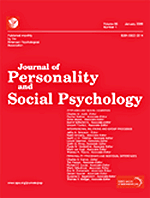
JOURNAL OF PERSONALITY AND SOCIAL PSYCHOLOGY
Exploring the Depths of Human BehaviorJournal of Personality and Social Psychology, published by the American Psychological Association, stands as a premier resource in the fields of social psychology and sociology, offering critical insights into the dynamics of human behavior and interpersonal relationships. With an impressive impact factor and ranked in the top tier of academic journals—Q1 in both Social Psychology and Sociology & Political Science—it consistently attracts high-caliber research submissions that advance theoretical and practical knowledge. Established in 1965, this journal has become a cornerstone for scholars and practitioners alike, facilitating the dissemination of pivotal studies in understanding social influences and individual personalities. As a key player in its field, it is essential reading for anyone involved in psychological research, providing a platform for innovative ideas and comprehensive analyses. Despite its subscription-only access model, its influence is reinforced by its consistently high rankings on Scopus, underscoring its significance by being in the 98th percentile for sociology and the 97th percentile for social psychology. Academics looking to delve into transformative concepts around personality and social interactions will find Journal of Personality and Social Psychology an invaluable addition to their resources.

Reading Psychology
Exploring the Intersection of Reading and MindReading Psychology, published by Routledge Journals, Taylor & Francis Ltd, is an esteemed journal dedicated to exploring the multifaceted relationship between reading processes and psychological principles. Since its establishment in 1979, this journal has provided a crucial platform for researchers, educators, and psychologists, addressing pivotal themes in Developmental and Educational Psychology, Education, and Linguistics and Language. With a commendable impact factor and a robust ranking within Scopus across multiple categories, including Q1 in Linguistics and Language, Reading Psychology plays an indispensable role in advancing scholarly discourse. Although it currently does not provide Open Access options, it remains a vital source of innovative research that informs theory and practice. The journal aims to cultivate a deeper understanding of reading behaviors, foster interdisciplinary collaboration, and ultimately enhance educational techniques, making it essential reading for anyone committed to the study of reading and cognition.
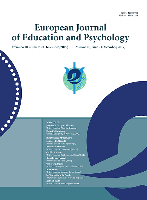
European Journal of Education and Psychology
Fostering Dialogue Between Educational Theory and Psychological Practice.The European Journal of Education and Psychology, published by Universidad Autonoma de Chile, stands at the intersection of education and psychological research, offering a dynamic platform for scholarly discourse. With an ISSN of 1888-8992 and E-ISSN 1989-2209, this open-access journal has been committed to disseminating knowledge since 2015, providing researchers, professionals, and students unrestricted access to cutting-edge studies in both fields. Despite its young trajectory, it has achieved notable recognition, currently positioned in Q3 for both Education and Psychology (miscellaneous) categories as of 2023. The journal’s ranking reflects its commitment to high-quality academic contributions, with a Scopus rank of #808 in the Social Sciences - Education, and #140 in General Psychology. By fostering interdisciplinary dialogue, the journal not only enriches academic literature but also influences practical applications in educational settings and psychological practices. Engage with the latest research and contribute to the evolving discourse in education and psychology.